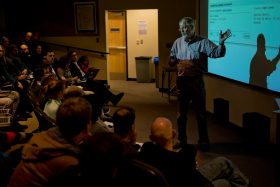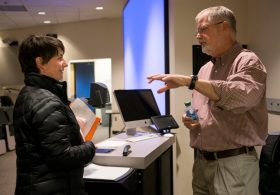Daniel M. Russell, über tech lead for Google Search Quality & User Happiness, encouraged School of Communications students to stay on top of changes to search engine technology as he offered advice for delving deeper into online queries.

Enter the coordinates into Google Maps to find the location on a map, and in many instances, you can also view the surrounding area for yourself using the Street View feature. As one top Google researcher described it, the possibilities for online sleuthing are almost limitless.
Photo identification was just one of several tips offered March 6 by Daniel M. Russell, über tech lead for Google Search Quality & User Happiness, who visited campus at the invitation of Janna Anderson, director of Elon University’s Imagining the Internet Center.
Russell’s presentation, “Digging in with Google: Search Tips & Strategies for Researchers,” captivated students and faculty in the ground floor theatre of the School of Communications. His methods, he said, are hallmarks of good investigative reporters, and the advice Russell shared ranged from understanding the visual hierarchy of Google result pages to crafting better search queries using language the way the average user might think about a topic.
“One thing I recommend you do is sign up for a blog for one of the various search engines just so you’re notified with anything new,” Russell said. “This is the kind of thing you need to take in as part of your permanent learning agenda. … There’s new stuff that’s happening constantly. Know what’s possible to ask.”
Other lessons shared with students:
- For tasks involving more than 15 minutes, maintain notes in an online document to make it easier for future searches.
- Keep track of questions, important people, resources, articles, websites and images along the way.
- Use notations and bold things in your notes that are important.
- Keep queries simple and “don’t try to outthink Google.” Remember, he said, it’s not a machine that wrote the content displayed on most websites.

And never forget to use appropriate word search shortcuts when looking for specific terms on a web page filled with lots of text. On Mac computers, that shortcut is Command-F; for PCs, it’s Control-F. “It takes 12 percent of your search time if you don’t know this,” he said. “I just gave you 12 percent of your life back. You rarely get that kind of a deal.”
Russell earned his doctorate in computer science from the University of Rochester, specializing in artificial intelligence before discovering that magnifying human intelligence was his real passion. In addition to his work with Google, Russell is the resident futurist at the University of Maryland in the Office of the Vice President for Research.
He has held research positions with IBM, Apple and Xerox over the course of his career.


